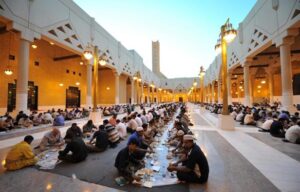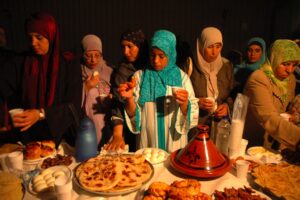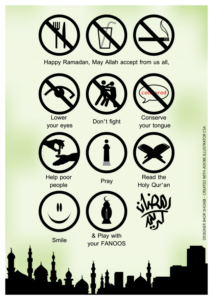RAMADAN


RAMADAN – MEANS MEANS SCORCHING HEAT OR DRYNESS
A crescent moon can be seen, marking the beginning of the Islamic month of Ramadan
Followers are required to fast in the daylight hours from sunrise to sunset for one lunar month. This commemorate the first revelation of the Quran to Muhammad . It is regarded as one of the five pillars of Islam.
NO LIQUIDS
The fast is not only for food but included is the drinking of any liquids. There are other prohibitions in addition to fasting; no smoking, and no engaging in sexual relations.
There is a pre-fast meal before sunrise and a meal after sunset to break the fast.
The hadith says
“When Ramadan arrives, the gates of Paradise are opened and the gates of hell are locked up and devils are put in chains.”
It is a period of increased prayer.
The reward for this fasting is spiritual rewards believed to be multiplied significantly within the month of Ramadan. All good deeds are more handsomely rewarded during Ramadan than in any other month of the year.
THE “HOLIEST NIGHT OF THE YEAR”
During Ramadan there occurs a very special night. The first revelation of the Quran was sent down to Muhammad stating that this night was
“better than one thousand months of proper worship.”
According to a 2012 Pew Research Centre study of 39 countries and territories, there is widespread Ramadan observance, with a median of 93%
CRIMINAL IF YOU DON’T
In some Muslim countries, failing to fast during Ramadan is considered a crime and is prosecuted as such. For instance, in Algeria, in October 2008 the court of Biskra condemned six people to four years in prison and heavy fines.
Kuwait, according to law number 44 of 1968, the penalty is a fine of no more than 100 Kuwaiti dinars, (about US$330, GB£260 in May 2017) or jail for no more than one month, or both penalties, for those seen eating, drinking or smoking during Ramadan daytime.
In some places in the U.A.E., eating or drinking in public during the daytime of Ramadan is considered a minor offence and would be punished by up to 150 hours of community service.[60]
In Saudi Arabia, described by The Economist as taking Ramadan “more seriously than anywhere else”,[61] there are harsher punishments including flogging, imprisonment and, for foreigners, deportation.

